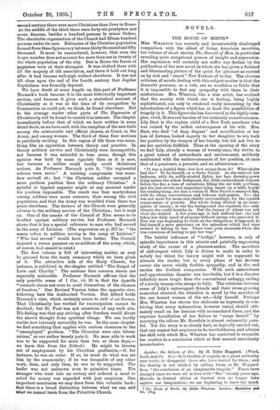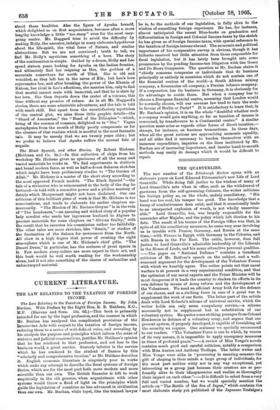comparison with the ablest of living American novelists, her volume
of short stories, The Descent of Man, in particular revealing quite exceptional powers of insight and expression. Her reputation will certainly not suffer any decline by the publication of her new novel, in which she has given a finished
and illuminating picture of the quest for pleasure as carried on by rich and "smart" New Yorkers of to-day. The obvious criticism of novels dealing with this subject-matter is that the
dramatis personae, as a rule, are so worthless or futile that it is impossible to feel any sympathy with them in their misfortunes. Mrs. Wharton, like a true artist, has realised that the society with which she is dealing, being highly
sophisticated, can only be rendered really interesting by the
introduction of a figure which has at least the possibilities of tragedy in it. This figure she has discovered in the highly com- plex, vivid, ill-starred heroine of her ironically named romance.
Lily Bart is the orphan child of a New York merchant who was ruined by the selfish extravagance of his wife. Mrs. Bart, who died "of deep disgust" and mortification at her loss of fortune, looked- eagerly to her daughter to win back her position by the weapon of her beauty, but did not live to see her ambition fulfilled. Thus at the opening of the story we find Lily, already a woman of twenty-nine, the victim to
a great extent of antecedents and environment, suddenly confronted with the embarrassments of her position, at once that of a pensioner, a parasite, and an adventuress "It was a hateful fate—but how escape from it? What choice had she ? To be herself, or a Gerty Parish. As she entered her bedroom, with its softly-shaded lights, her lace dressing-gown lying across the silken bedspread, her little embroidered slippers before the fire, a vase of carnations filling the air with perfume, and the last novels and magazines lying uncut on a table beside the reading-lamp, she had a vision of Miss Parish's cramped flat, with its cheap conveniences and hideous wall-papers. No ; she was not made for mean and shabby surroundings, for the squalid compromises of poverty. Her whole being dilated in an atmo- sphere of luxury ; it was the background she required, the only climate she could breathe in. But the luxury of others was not what she wanted. A few years ago it had sufficed her : she had taken her daily meed of pleasure without caring who provided it. Now she was beginning to chafe at the obligations it imposed, to feel herself a mere pensioner on the splendour which had once seemed to belong to her. There were even moments when she was conscious of having to pay her way."
The baleful influence of "bridge," however, is only of episodic importance in this minute and painfully engrossing
study of the career of a pleasure-seeker. The sacrifices of self-respect which Lily is driven to make in order to satisfy her thirst for luxury might well be supposed to alienate the reader, but in every phase of her devious career she never wholly forfeits sympathy, and in the end excites the liveliest compassion. With such antecedents and opportunities disaster was inevitable, but it is a disaster infinitely more tragic than the conventional unhappy ending of a lovely woman who stoops to folly. The relations between some of Lily's extravagant friends and their wives growing somewhat strained, the situation is saved by the sacrifice of the one honest woman of the set,—Lily herself. Perhaps Mrs. Wharton has shown too elaborate an ingenuity in con- triving that every indiscretion, however venial, should ulti- mately recoil on her heroine with accumulated force, and the supreme humiliation of her failure to "range herself " by marrying the odious Mr. Rosedale is almost unbearably pain- ful. Yet the story is so closely knit, so logically carried out, that one cannot but acquiesce in its inevitableness, and admire the skill with which Mrs. Wharton has contrived to reconcile her readers to a conclusion which at first seemed mercilessly inconclusive.
Ayesha: the Return of She. By H. Eider Haggard. (Ward, Lock, and Co. 6s.)—It is the fate of sequels, as a great authority once wrote, to disappoint those who have waited for them; and the destiny is not shirked by calling them, as Mr. Haggard does, " the conclusion of an imaginative tragedy." Times have changed since we were all in love with " She " twenty years ago. Marvels in Central Africa or Central Asia no longer take captive our imagination ; we are beginning to know too much • The House of Mirth. By Edith Wharton. London : Macmillan sad Co. [684
about these localities. Also the figure of Ayesha herself, which delighted us on first acquaintance, becomes after a more lengthy knowledge a little " too steep" even for the most easy- going reader. Mr. Haggard tries to avoid the difficulty by making Holly, the narrator, indulge in many elaborate hypotheses about the life-spirit, the vital force of Nature, and similar abstractions. But we are not convinced; truth to tell, we find Mr. Holly's mysticism something of a bore. The story of the continuation is simple. Guided by a dream, Holly and Leo spend sixteen years looking for Ayesha on the Indian frontier, and ultimately find her reigning as Hes, the goddess of a mountain somewhere far north of Tibet. She is old and wrinkled, as they left her in the caves of Lir ; but Leo's love rejuvenates her, and after breaking the power of the Khania of Kaloon, her rival in Leo's affections, she marries him, only to find that mortal cannot mate with immortal, and that he is slain by her love. She then departs down the crater of a volcano, this
time without any promise of return. As in all Mr. Haggard's stories, there are some admirable adventures, and the tale is told with much skill. But apart from the unsatisfactory mysticism of the central plot, we miss those little graphic details—the " Shard of Amenartas," the " Head of the Ethiopian "—which, being of the essence of romance, delighted us in " She." Vague metaphysics from the mouth of Holly poorly compensate us for the absence of that realism which is needful in the most fantastic tale. It may be merely that we are twenty years older; but we prefer to believe that Ayesha suffers the normal fate of sequels.
The Black Spaniel, and other Stories. By Robert Hichens. (Methuen and Co. 6s.)—In this collection of chips from his workshop Mr. Hichens gives us specimens of all the many and varied materials he works in. We find experiments in diablerie and broad modern farce, as well as half-a-dozen Saharan sketches which might have been preliminary studies to "The Garden of Allah." Mr. Hichens is a master of the short story according to the most approved French models. "The Black Spaniel "—the tale of a vivisector who is reincarnated in the body of the dog he tortured—is told with a recondite power and a pitiless mastery of details which Maupassant might not have disdained. Our one criticism of this brilliant piece of work is that Mr. Hichens is too conscientious, and tends to elaborate his earlier chapters un- necessarily. " The Mission of Mr. Eustace Groyne " is in the vein of " The Londoners,"—an amusing and wicked story of a popular lady novelist who sends her ingenuous husband to Algiers to procure materials for some chapters on " African frailty," with the result that he executes his commission rather too faithfully. The other tales are mere sketches, like " SmaIn," or studies of the fascination of the Sahara for newcomers from the North. All show in a high degree that power of creating the right atmosphere which is one of Mr. Hichens's chief gifts. "The Desert Drum," in particular, has the eeriness of great spaces in it. Few modern story-tellers are more expert in their art, and this book would be well worth reading for the workmanship alone, had it not also something of the charm of unfamiliar and nnhacluieyed material.



















































 Previous page
Previous page